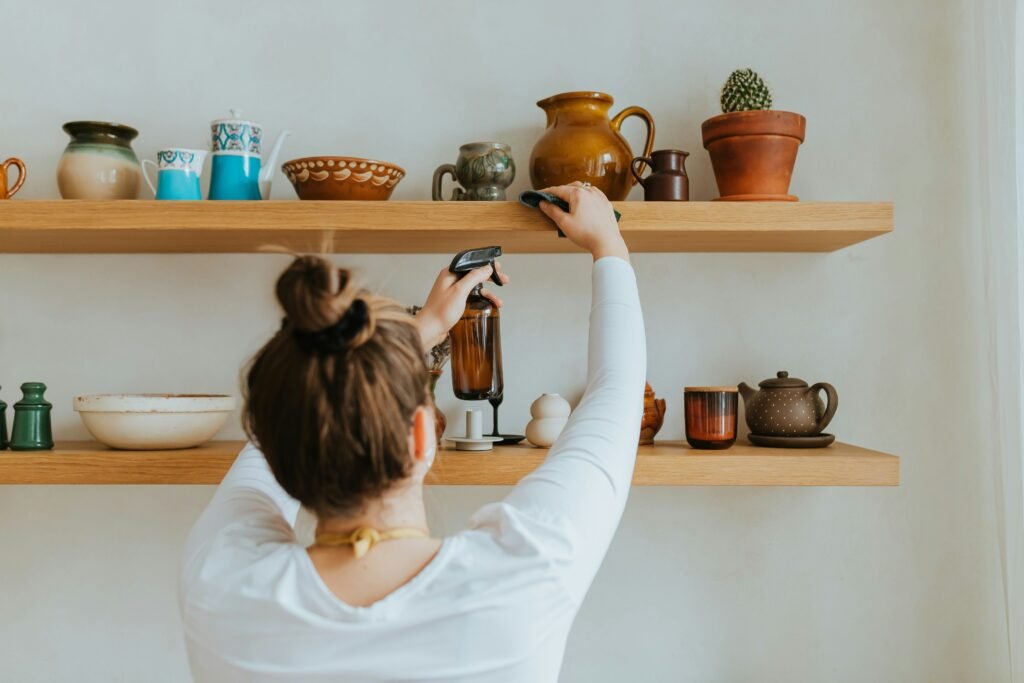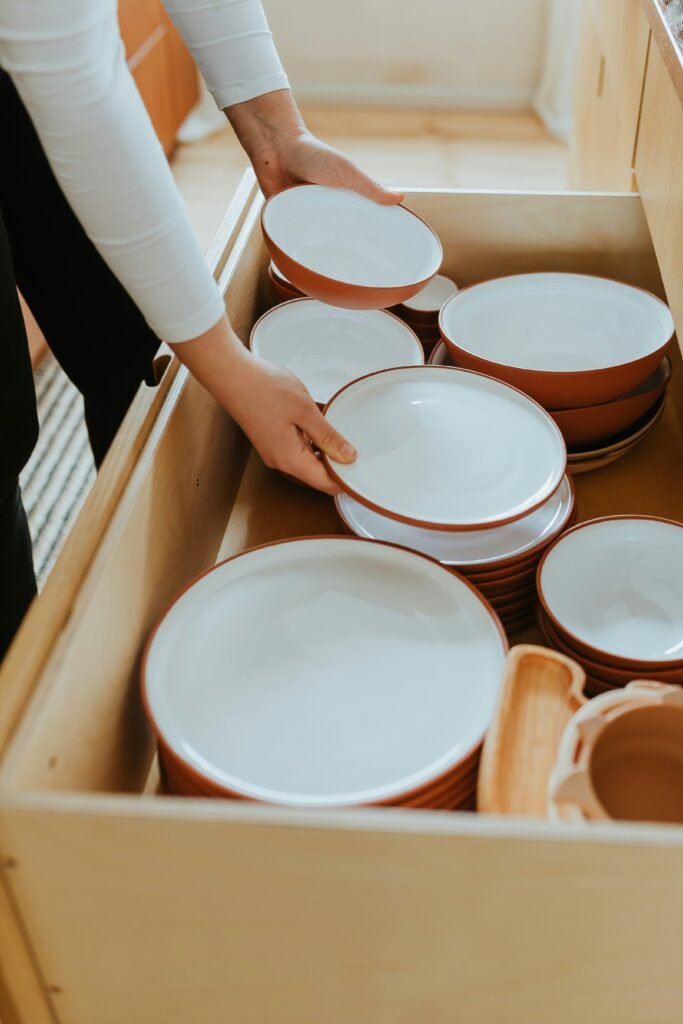A gentle, realistic guide to creating a calmer home — one small step at a time
Let’s be honest: the idea of a clean, uncluttered home feels dreamy. More calm. More space. More breathing room. Less visual noise screaming “fix me!” every time you walk by.
But actually decluttering?
That’s another story.
Because clutter isn’t just… stuff.
It’s guilt.
It’s memories.
It’s “I’ll use this someday.”
It’s “I paid good money for this.”
It’s “this belonged to someone I love.”
It’s decision fatigue, emotional weight, overwhelm — and sometimes, it’s just plain exhaustion.
So if decluttering feels hard for you (or if you’ve started 40 times and stopped), guess what?
You’re normal. You’re human. And you’re definitely not alone.
This guide is here to help you purge your home gently, realistically, and without feeling like you’re drowning in decisions.
Let’s take it one doable step at a time.

1. Start With One Tiny Space (Seriously — tiny)
Forget the idea of tackling the whole house in one go.
Don’t even pressure yourself to “do the kitchen” or “do the closet.”
Start small:
- one drawer
- one shelf
- one basket
- one category (like socks, pens, or makeup)
Why this works:
A tiny win builds momentum. It gives your brain a quick success, which motivates you to keep going. Decluttering is 70% mindset — and small victories help you shift mentally.
Make it so small that you can’t fail.
2. Set a Timer — 15 Minutes Is Enough
You don’t need a free weekend or a deep-clean mood.
You just need 10–15 minutes.
Set a timer and go.
When the timer ends, you can stop guilt-free.
Or — this happens to most people — you get into a groove and keep going.
Think of it as “decluttering snacks” instead of a huge decluttering meal.
Short. Light. Easier to digest.
3. Use the “Does This Add Value?” Test
Instead of agonizing over what to toss, try asking one simple question:
Does this add value to my life?
Value can mean:
- I use it regularly
- It makes my life easier
- It makes me happy
- It’s meaningful
- It’s beautiful
But if the answer is:
“Well… maybe… but…”
That’s usually a no.
Extra questions that help:
- Would I buy this again today?
- Do I even like this?
- Do I feel lighter imagining this gone?
If you don’t love it and you don’t use it, you don’t need it.

4. Declutter When You’re Already Annoyed
This sounds funny, but it works incredibly well.
If you’re in a mood — irritated, fed up, stressed — channel that fire into decluttering.
Annoyance gives you the courage to let go of things you’d normally hesitate about.
Angry-cleaning is a superpower. Use it.
5. Make Three Clear Piles: Keep, Donate, Toss
No fourth pile.
No “maybe later” box.
No “I’ll think about it tomorrow” box.
Just three:
- Keep — you actually use it or love it
- Donate — still good, but not for you
- Toss — broken, expired, damaged
Be honest. Be quick. Be kind to yourself.
Try to avoid touching the same item twice — the more decisions you revisit, the harder decluttering becomes.
6. Take Photos of Sentimental Items
Letting go of sentimental things is the hardest part for most people.
Maybe it’s:
- your child’s old drawings
- a gift you never liked
- souvenirs
- your grandmother’s tea set
- clothes from an old chapter of your life
If the memory is what makes it special, a photo will preserve that beautifully — without the physical clutter.
You keep the meaning, not the object.
It’s a gentle middle ground between holding on and letting go.

7. Don’t Declutter for Your “Fantasy Self”
We all have a fantasy version of ourselves:
- the woman who bakes fresh bread every weekend
- the woman who wears heels daily
- the woman who paints
- the woman who does intense home workouts
- the woman who uses 14-step skincare routines
But your real life deserves items that match your real lifestyle.
Keep what serves the you of today, not the imaginary “perfect” version of you.
That bread maker collecting dust?
Those jeans from 10 years ago?
That stack of craft supplies you haven’t touched?
Your home should fit your real life, not your fantasy one.
8. Remember: Empty Space Has Value Too
Sometimes we keep things because we feel like empty space is “wasted.”
But that space is:
- mental breathing room
- visual calm
- peace
- clarity
- freedom
A shelf doesn’t need to be full to be “useful.”
Empty space is productive.
It’s therapeutic.
It’s intentional.
Let rooms breathe.
Let shelves breathe.
Let you breathe.
9. Use the 20/20 Rule
If you’re stuck on “just in case” items, this rule is life-changing:
If you can replace it for under $20 in under 20 minutes, you don’t need to keep it.
This applies to:
- extra cords
- old makeup
- random kitchen tools
- backup items
- overly specific gadgets
- cheap decor
- things you’ve kept “just in case” for years
Holding onto clutter “just in case” costs more in stress and space than replacing it would.
10. Forgive Yourself for Past Purchases
Decluttering can bring guilt:
- “I wasted money on this.”
- “I never used it.”
- “What was I thinking?”
- “I should have returned it.”
- “I feel so bad getting rid of it.”
But here’s the truth:
You made the best decision you could with the information, budget, and circumstances you had at the time.
Keeping something out of guilt doesn’t make the purchase more “worth it.”
Letting go frees you from that guilt.
Release the object.
Release the shame.
Move forward lighter.

11. Celebrate Every Single Win — Big or Small
Decluttering is emotional work, not just physical work.
So celebrate:
- one cleared drawer
- one donated bag
- one tidy shelf
- one box removed
- one decision you made without guilt
Take a “before and after” picture — even for tiny areas.
Seeing progress visually makes a massive difference in motivation.
Reward yourself with:
- a cup of tea
- a cozy break
- a quiet moment
- your favorite playlist
- time doing something that fills you
You’re not just decluttering your home — you’re decluttering your life.
Final Thoughts: Decluttering Doesn’t Have to Hurt
You don’t need to do everything in one day.
You don’t need to purge your entire home in one weekend.
You don’t need to be perfect.
You just need:
- small steps
- gentle effort
- honest decisions
- patience
- and kindness toward yourself
Decluttering is not about becoming a minimalist.
It’s about creating a home that supports the life you want — calm, peaceful, organized, and full of ease.
Your home doesn’t need perfection.
It needs intention.
And every little step you take brings you closer to a space that feels like you again.

